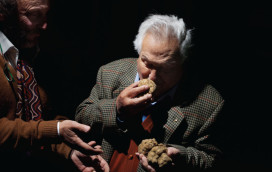For some of us, vacations are an opportunity to indulge in bacchanalian delights. Others view them as a chance to kick-start a healthy routine, with advice from spa experts and access to fresh, healthy menus. We might think of this focus on weight and body shape as a fairly modern concern, yet there’s nothing new about dieting. The ancient Greeks understood that the secret to losing weight was time and moderation (though also, unfortunately, avoiding sex, running naked and post-lunch vomiting). For early Christians, gluttony, displayed on the body in the form of excess flesh, was one of the seven deadly sins – and you could say we’ve been feeling guilty ever since. The rise of mass media in the 19th century brought us a nascent celebrity culture, diet ads and seductive before-and-after images, and it fed and bred the shame and anxiety that still drives our weight-loss mania. It remains big business.
In 1829, William Wadd, one of many new diet gurus, advised chewing tobacco, horseback riding, reading aloud, sweating, sprinkling your body with hot sand and eating a bar of soap a day to “reduce exuberant fat”. He also recommended a low-carb/high-protein diet – sound familiar? He was one of the first in a long chain of diet-mongers, leading up to the likes of Robert Atkins and Pierre Dukan, selling regimes that are ostensibly revolutionary, but many of which are not new, and not necessarily harmless.
Quick-fix fad diets first took off in the Victorian period. The Victorians took weight-loss pills too, just as many dieters do today. Preparations such as Dr Gordon’s Elegant Pills contained either deadly or useless ingredients including arsenic, strychnine, lard, soap, Epsom Salts and dessicated thyroid extract. Tape-worm pills speak for themselves. A century ago, tens of thousands were taking the deadly Dinitrophenol – a carcinogenic dying agent also used in First World War explosives – to speed up their metabolism, and fatalities still occur. Today’s costly over-the-counter slimming pills suggest you’ll lose a few pounds over recommended periods, measly amounts you could manage by ditching biscuits. In the early 20th century, you might have swallowed Bile Beans or Figuroids, or masticated laxative-laced chewing gums such as Silph or Elfin Fat Reducing Gum Drops. Dieters could bathe in Every Woman’s Flesh Reducer or the Lesser Slim-Figure-Bath – with the useless ingredients of table salt, alum, camphor, baking soda, citric acid, cornstarch, and borax – or scrub away fat with a Slenmar Reducing Brush and La-Mar Reducing Soap. Melting your fat was popular, too, with a luminous light or hydro-electric iodized bath (which sounded scientific but had no discernible effect). Skin-macerating rubber knickers enjoyed a vogue, as did fat-bashing trunk rollers, stomach beaters, vibrating chairs and electric shocks. Now you can buy cellulite-reducing crystal-infused tights or a Slendertone for “electrical muscle stimulation”. There really is nothing new in the unpleasant business of “fat cures”.
One of the oddest diet gurus of the era was Horace Fletcher, the “Great Masticator”. Fletcherism involved chewing every mouthful hundreds of times – even Henry James and Franz Kafka were devotees – and its creator was hailed as a medical icon. Today, some diet businesses still follow his basic tenets. Massage, too, remains popular – in the 1930s, Sylvia of Hollywood massaged stars, including Jean Harlow and Gloria Swanson, so that fat came out through their pores “like mashed potato through a colander”. The group approach, including Weight Watchers (founded in 1963), has been shown to be relatively successful and effective, much more so than the plethora of mad fad diets we’ve been sold, from the Baby Food Diet to the Russian Air Force Diet, the Zone, Paleo, Blood Type, Better Sex Diet, ad infinitum.
In February this year, a study published in The Journal of the American Medical Association found that those who ate vegetables and whole foods while cutting back on sugar and highly processed foods, lost significant amounts of weight over 12 months. This without counting calories or limiting portions. Our reliance on calorie-counting, with us for some 120 years, has been sidelined. There was no significant difference in weight loss between those on a healthy low-fat diet and those sticking to a healthy low-carbohydrate one. Success didn’t seem to be influenced by genetics or insulin-response to carbs, meaning that the increasingly popular idea that different diets should be recommended based on one’s DNA makeup is also now in doubt. Rather, if we want to lose weight we should concentrate on sustaining a diet of minimally processed whole and fresh foods. In fact, why not simply follow the ancient Greeks, and eat moderately, healthily and regularly over a long period of time. A lifetime, in fact.
Louise Foxcroft’s Calories and Corsets: A history of dieting over two thousand years is out now, published by Profile Books



